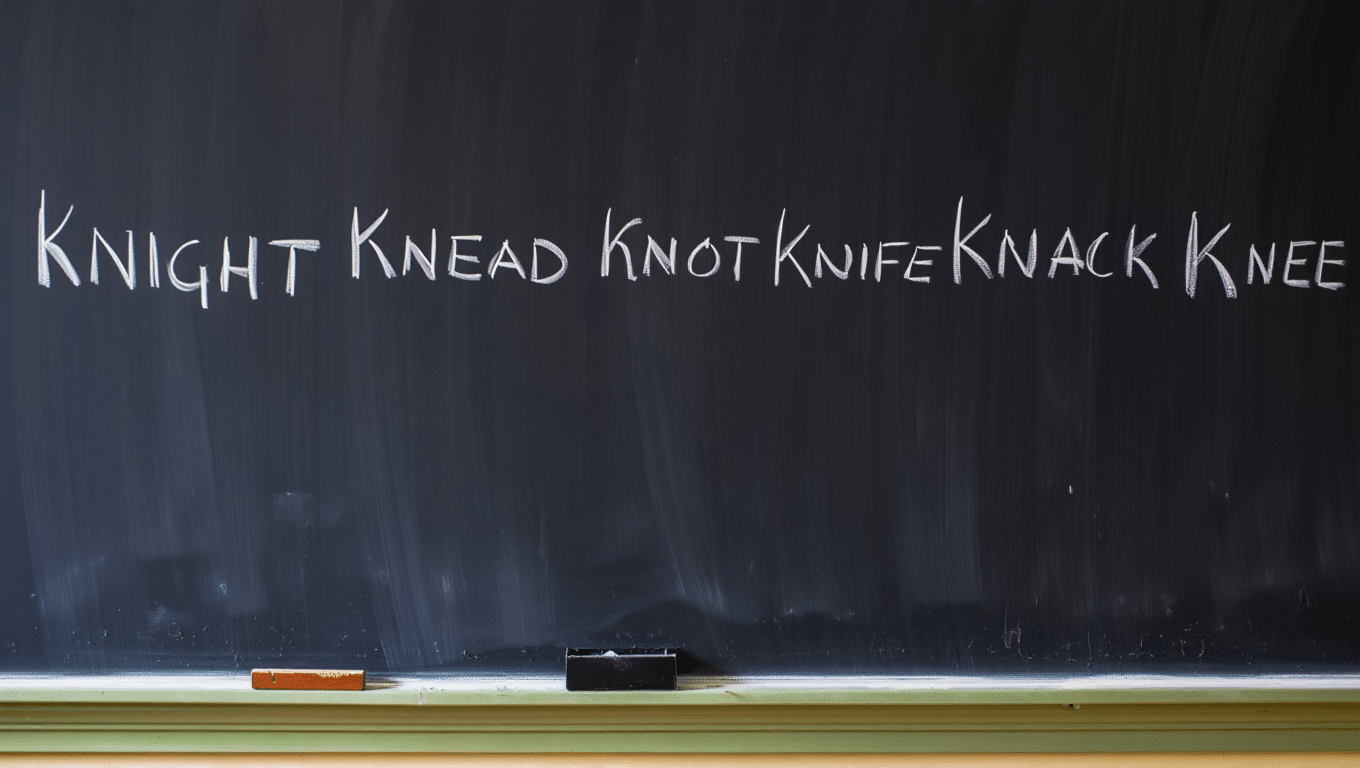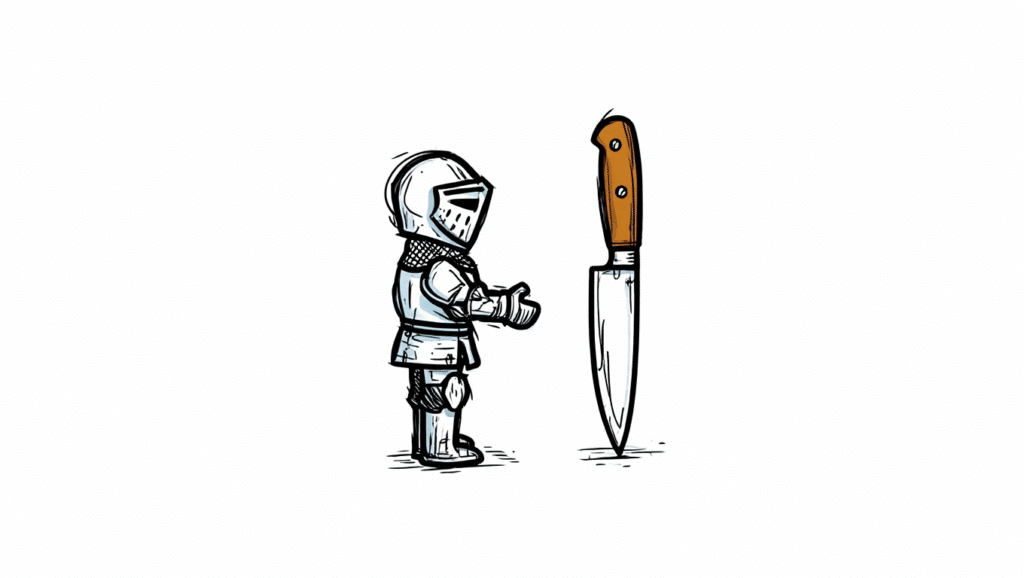Ever wonder why the letter K just sits there, silent and smug, in words like “knee” and “knife”? Well, buckle up! These sneaky, silent K words are everywhere.
They’re like that friend who shows up uninvited but somehow makes the party better.
From knights to knots, these words with silent k have been pranking us for centuries. But they’re essential. Try talking without them, and you’ll sound like you’re speaking in riddles.
So let’s look into this wonderfully weird world where K keeps quiet but never keeps still!
Why is it Crucial to Learn About Silent Letters?
Silent letters aren’t just English being dramatic; they’re actually your secret weapon for sounding like you know what you’re doing.
Think about it: mispronouncing “knee” as “ka-nee” at the doctor’s office? Awkward. Once you crack their code, reading becomes way less like solving puzzles.
- Spelling becomes less of a nightmare: No more guessing why “knife” has that random K hanging around.
- Pronunciation confidence skyrockets: You’ll never accidentally say “ka-night” instead of “night” again.
- Reading fluency improves: Your brain stops doing double-takes on common words.
- Writing looks more polished: Because nobody wants to write “nife” in their grocery list.
List of Words with Silent K that You Can’t Miss

From everyday terms like “knee” to more obscure words like “knight,” these silent “K” words are essential to understand for anyone looking to master the language.
Below is a list of must-know words with a silent k, each playing a key role in both writing and speech
1. Knee: The joint between the thigh and lower leg. (noun)
2. Knight: A man awarded an honor for service. (noun)
3. Know: To be aware of something. (verb)
4. Knife: A cutting tool with a blade. (noun)
5. Knot: A loop or tangle in rope or string. (noun)
6. Knock: To strike something with a sound. (verb)
7. Knead: To work dough with hands. (verb)
8. Kneel: To lower oneself to the knees. (verb)
9. Knob: A rounded handle or control. (noun)
10. Knotty: Full of knots, or complex. (adjective)
11. Knack: A special skill or talent. (noun)
12. Knave: A dishonest or unscrupulous man. (noun)
13. Knell: The sound of a bell, especially for death. (noun)
14. Knish: A small pastry filled with ingredients. (noun)
15. Knurl: A small raised ridge on a surface. (noun)
16. Knout: A whip used for punishment. (noun)
17. Knickerbocker: A type of pant or person from New York. (noun)
18. Knapsack: A bag with straps, worn on the back. (noun)
19. Knockout: A decisive defeat. (noun)
20. Knighthood: The rank or dignity of a knight. (noun)
21. Knuckle: A joint in the fingers. (noun)
22. Knurled: Having a roughened surface for grip. (adjective)
23. Kneeled: Past tense of kneel; to have lowered oneself to the knees. (verb)
24. Knitter: A person who makes knitted fabric. (noun)
25. Knitting: The act of making fabric by interlacing yarn. (verb)
26. Knockout: A blow that incapacitates an opponent. (noun)
27. Knocked-up: Informal term for pregnant. (adjective)
28. Knee-high: Reaching up to the knee in height. (adjective)
29. Knocker: A device used to knock on doors. (noun)
30. Knives: Plural of knife; cutting instruments. (noun)
31. Knotting: The act of tying knots. (verb)
32. Knobbed: Having knobs or rounded protrusions. (adjective)
33. Knoll: A small hill or mound. (noun)
34. Knobble: To make or become knobby. (verb)
35. Kneecap: The round, bony structure in the knee. (noun)
36. Kneejerk: An automatic or reflex response. (adjective)
37. Knaves: Plural of knave; dishonest men. (noun)
38. Knees-up: A lively social event or party. (noun)
39. Knockdown: A forceful fall or defeat. (noun)
40. Knickers: Women’s undergarments or loose pants. (noun)
41. Knolling: The act of arranging objects neatly at right angles. (verb)
42. Knucklehead: A foolish or silly person. (noun)
43. Kith: Friends or acquaintances; a group of people with shared interests. (noun)
44. Knits: Third-person form of knit; making fabric by interlacing yarn. (verb)
45. Knuckleball: A baseball pitch that is hard to predict. (noun)
46. Knackered: Extremely tired or worn out. (adjective)
47. Knee-high: Reaching up to the knee, often used to describe socks. (adjective)
Tips and Tricks to Learn
Learning about words with silent k doesn’t have to feel like memorizing a phone book. Most silent K words follow sneaky little rules that make total sense, well, sort of.
- The “KN” combo rule: When K and N team up at the start of words, K always plays dead (knee, know, knot)
- Look for word families: If you know “knife,” you automatically get “knives” and “knifing”.
- Practice with rhyming: “Knee” rhymes with “bee,” not “key”, your ears will thank you.
- Use memory tricks: Picture a silent knight on a quiet night (works every time).
- Read aloud regularly: Your mouth needs practice making these sounds feel natural.
Final Thoughts
Silent K words might seem like English just showing off, but they’re actually pretty manageable once you get the hang of them.
These letters have been quietly (pun intended) shaping how we speak for ages, and mastering them is like unlocking a secret level in language.
Don’t expect to master every silent K word overnight; that’s not how language works. But with a little practice and those handy tricks, you’ll be knocking out these tricky words like a pro.
The beauty of silent letters is that they make English uniquely quirky. Sure, they’re confusing at first, but they’re also part of what makes our language rich and interesting.
















